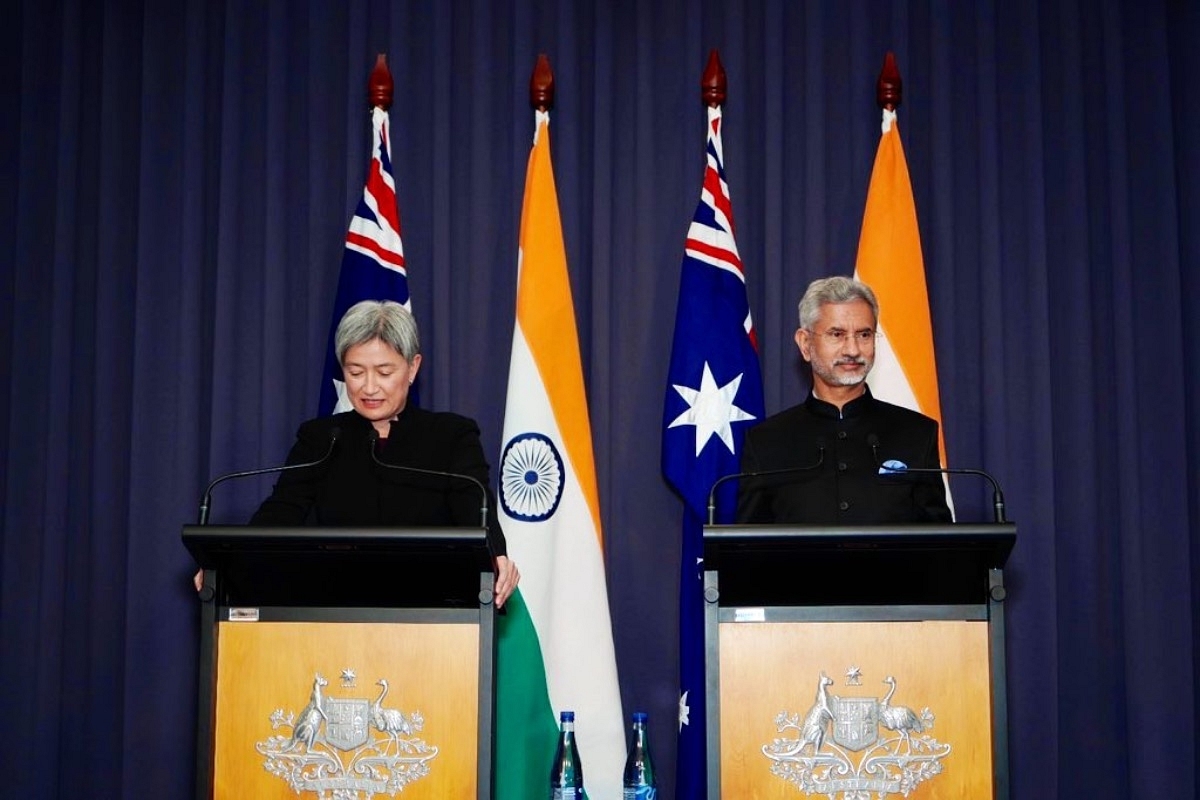World
India And Australia Highlight Importance Of Rules-Based International Order, Freedom Of Navigation In International Waters

EAM S Jaishankar with his Australian counterpart Penny Wong (Pic Via Twitter)
Canberra, Oct 10 (PTI) India and Australia, as liberal democracies, believe in a rules-based international order, in freedom of navigation in international waters, in promoting connectivity, growth and security for all, External Affairs Minister S Jaishankar said on Monday, amidst China's aggressive posturing in the strategic Indo-Pacific.
Addressing a joint press conference here with his Australian counterpart Penny Wong, Jaishankar said he had a 'very, very useful, very productive, very comfortable discussion' and part of it was due to the fact that they have been meeting quite often, including on the sidelines of major multilateral conferences.
Wong said that Australia and India have recognised that the Indo-Pacific region is being 'reshaped' both economically and strategically and underlined that the partnership with India is a 'critical part' of shaping the region.
Jaishankar said that he and Wong had broad ranging discussions and, I think the underpinning of that really is that, as liberal democracies, we both believe in a rules-based international order, in freedom of navigation in international waters, in promoting connectivity, growth and security for all.'
He also emphasised what the two sides have emphasised in ensuring that countries make 'sovereign choices on matters that are important to them.'
'Australia and India are comprehensive strategic partners. We are QUAD partners. We partner in many other ways and most fundamentally, we share a region, the Indo-Pacific region and between our countries, we span a great breadth of the Indo-Pacific,' she said after both ministers held the 13th Foreign Ministers' Framework Dialogue.
The Quad or Quadrilateral Security Dialogue comprises India, the US, Japan and Australia.
'The QUAD is a mechanism which is primarily focused on the Indo-Pacific. And I think that's an area where the convergence of interests between the Quad partners is particularly strong,' Jaishankar said.
'With our own areas of deep connection and expertise. We've got a shared interest and we share an ambition and that is our region is stable, prosperous and respectful of sovereignty, where countries are not required to choose sides, but make their own sovereign choices. We don't want to see any one country dominating or any country being dominated,' Wong added.
India, the US and several other world powers have been talking about the need to ensure a free, open and thriving Indo-Pacific in the backdrop of China’s rising military manoeuvring in the region.
China claims nearly all of the disputed South China Sea, though Taiwan, the Philippines, Brunei, Malaysia and Vietnam all claim parts of it. Beijing has built artificial islands and military installations in the South China Sea.
She also said that 'we both recognise our region is being reshaped, economically and strategically. And I think our partnership is a demonstration that we understand that this period of change is best navigated together.'
'We can only build and sustain the region we want by working with others, including by working in partnership with India and for Australia, this partnership is a critical part of shaping the region we want.'
After concluding his first-ever visit to New Zealand, Jaishankar received a 'Tiranga welcome' in Canberra.
'Arrived in Canberra to a Tiranga welcome. So happy to see the old Parliament House of Australia in our national colours,' he tweeted.
This is his second visit to Australia. The first visit was in February 2022.
(This story has been published from a wire agency feed without any modifications to the text. Only the headline has been changed.)
Introducing ElectionsHQ + 50 Ground Reports Project
The 2024 elections might seem easy to guess, but there are some important questions that shouldn't be missed.
Do freebies still sway voters? Do people prioritise infrastructure when voting? How will Punjab vote?
The answers to these questions provide great insights into where we, as a country, are headed in the years to come.
Swarajya is starting a project with an aim to do 50 solid ground stories and a smart commentary service on WhatsApp, a one-of-a-kind. We'd love your support during this election season.
Click below to contribute.
Latest